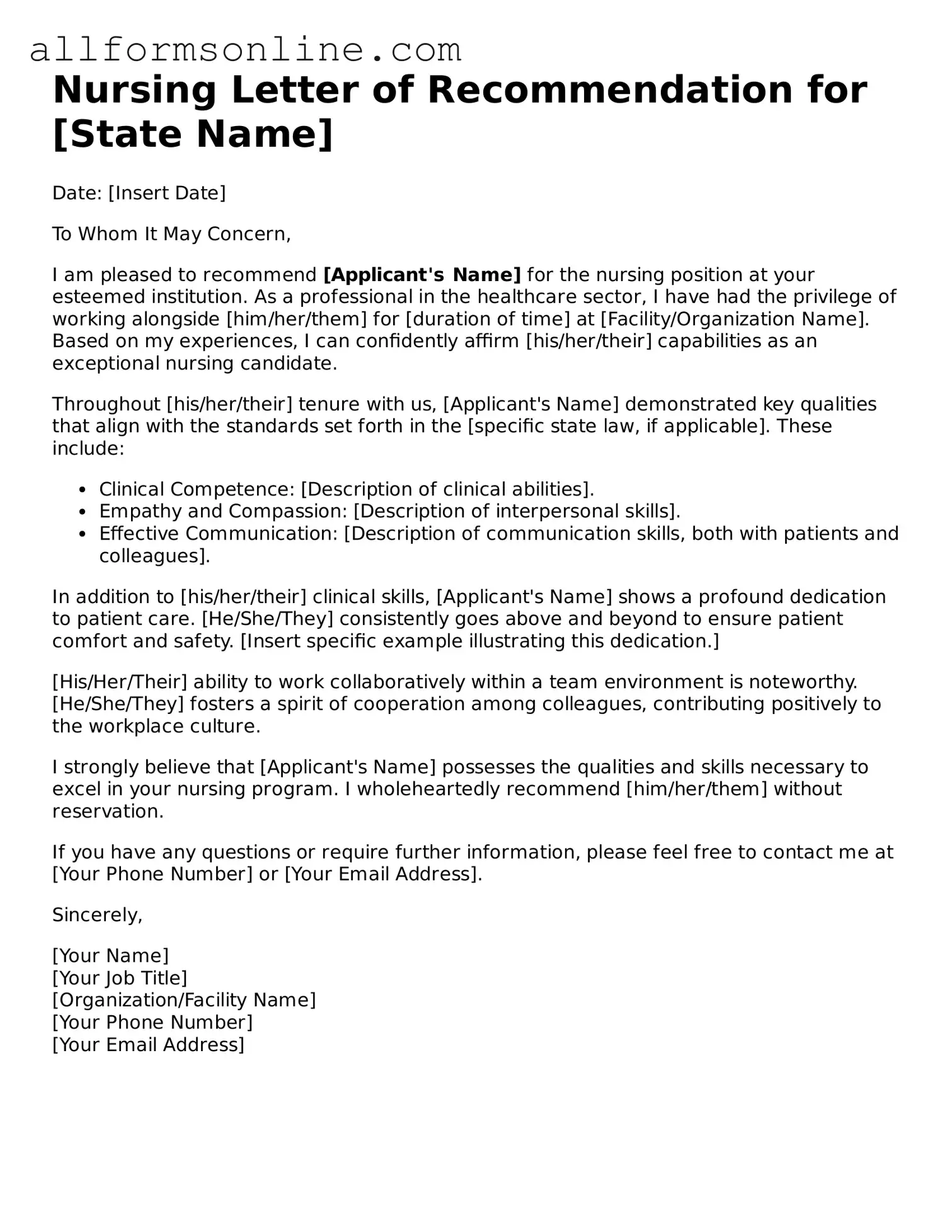Blank Nursing Letter of Recommendation Form
Misconceptions
- Only nurses can write a recommendation letter. Many people believe that only registered nurses or nurse practitioners can provide a valid recommendation. However, anyone who knows you well and can speak to your skills and character—like a teacher, employer, or volunteer supervisor—can write a letter.
- All recommendation letters must be from medical professionals. While letters from healthcare professionals can be beneficial, they are not the only option. A letter from a non-medical professional who can highlight your work ethic, leadership, or community involvement can also be impactful.
- The letter must be long and detailed. Some think that a longer letter is better. In reality, a concise letter that clearly outlines your strengths and qualifications is often more effective than a lengthy one filled with unnecessary details.
- Letters can be submitted at any time. Many believe that there are no deadlines for submission. However, it's crucial to check the specific requirements of the nursing program to ensure your letter is submitted on time.
- One letter is enough. Some applicants think that one strong letter will suffice. However, most programs prefer multiple letters to get a well-rounded view of your abilities and character. Aim for two to three letters.
- Once submitted, the letter cannot be changed. It's a common misconception that once a letter is submitted, it cannot be altered. If you realize a mistake or want to update it, contact the program to see if they will accept a revised letter.
- Recommendation letters are not important. Some candidates underestimate the value of a recommendation letter. In reality, these letters can significantly influence your application by providing insight into your qualifications and character that grades and test scores cannot convey.
What to Know About This Form
What is a Nursing Letter of Recommendation?
A Nursing Letter of Recommendation is a formal document that supports an individual's application to nursing programs or positions. It typically highlights the applicant's skills, character, and experiences relevant to nursing. This letter is usually written by someone who knows the applicant well, such as a professor, employer, or clinical supervisor.
Who should write my Nursing Letter of Recommendation?
It is advisable to choose someone who can provide a detailed and positive assessment of your abilities and character. Ideal writers include nursing instructors, clinical supervisors, or employers in healthcare settings. They should be familiar with your work ethic, skills, and potential as a nurse.
What should be included in the Nursing Letter of Recommendation?
The letter should include the writer’s relationship to the applicant, specific examples of the applicant's skills and achievements, and an overall assessment of the applicant’s suitability for nursing. It may also mention personal qualities such as compassion, teamwork, and dedication to patient care.
How long should the Nursing Letter of Recommendation be?
Typically, a Nursing Letter of Recommendation should be one page long. This length allows the writer to provide a concise yet comprehensive overview of the applicant’s qualifications without overwhelming the reader. Clarity and focus are key.
How do I request a Nursing Letter of Recommendation?
When requesting a letter, approach the potential writer politely and provide ample time for them to complete it. It is helpful to offer context about the nursing program or position you are applying for and share your resume or personal statement. This information can assist them in tailoring the letter to your specific goals.
When is the Nursing Letter of Recommendation due?
Deadlines for submission can vary depending on the nursing program or job application. It is essential to communicate these deadlines clearly to the writer. Aim to request the letter well in advance of the due date, allowing the writer sufficient time to craft a thoughtful recommendation.
Popular Nursing Letter of Recommendation Types:
Spousal Sponsorship Support Letters From Friends and Family - This statement includes the significance of our marriage to our individual identities.
To simplify the creation of effective endorsements, utilizing a tool like Fast PDF Templates can streamline the process, ensuring that all necessary information is captured accurately while maintaining the integrity and professionalism of the Recommendation Letter form.
How to Use Nursing Letter of Recommendation
Completing the Nursing Letter of Recommendation form is an essential step in the application process. This form requires specific information that will help the evaluator provide a comprehensive and supportive recommendation. Follow these steps carefully to ensure that the form is filled out correctly.
- Begin by gathering all necessary information. This includes the applicant's full name, contact details, and any specific details about the program or position they are applying for.
- Identify the person who will be writing the recommendation. Ensure that they are aware of their role and have agreed to provide the recommendation.
- Fill in the writer's details. This includes their name, title, organization, and contact information. Make sure this information is accurate.
- Provide context for the recommendation. Include how long the writer has known the applicant and in what capacity (e.g., as a professor, employer, or mentor).
- Detail the applicant's strengths and qualifications. This section should highlight specific skills, experiences, and attributes that make the applicant a strong candidate for nursing.
- Include any relevant examples or anecdotes that illustrate the applicant's abilities and character. Personal stories can add depth to the recommendation.
- Conclude the recommendation with a strong endorsement. The writer should clearly state their support for the applicant and express confidence in their potential.
- Review the completed form for accuracy and completeness. Check for any spelling or grammatical errors.
- Sign and date the form. The writer should ensure that their signature is included to validate the recommendation.
- Submit the form according to the specified instructions. This may involve sending it directly to the institution or providing it to the applicant for submission.
